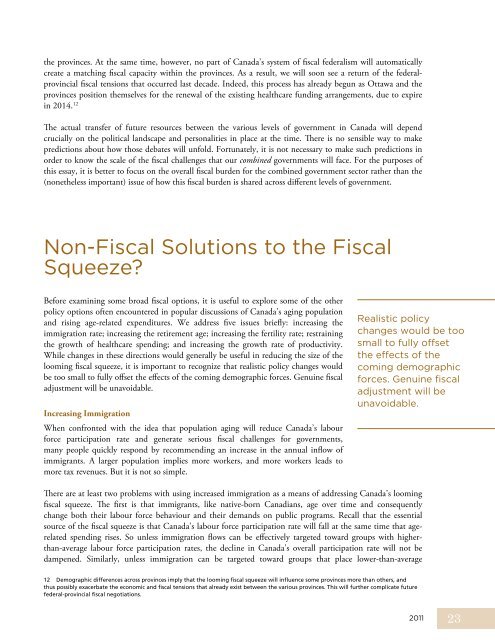Christopher Ragan, "Canada's Looming Fiscal Squeeze," November
Christopher Ragan, "Canada's Looming Fiscal Squeeze," November
Christopher Ragan, "Canada's Looming Fiscal Squeeze," November
Create successful ePaper yourself
Turn your PDF publications into a flip-book with our unique Google optimized e-Paper software.
the provinces. At the same time, however, no part of Canada’s system of fiscal federalism will automatically<br />
create a matching fiscal capacity within the provinces. As a result, we will soon see a return of the federalprovincial<br />
fiscal tensions that occurred last decade. Indeed, this process has already begun as ottawa and the<br />
provinces position themselves for the renewal of the existing healthcare funding arrangements, due to expire<br />
in 2014. 12<br />
The actual transfer of future resources between the various levels of government in Canada will depend<br />
crucially on the political landscape and personalities in place at the time. There is no sensible way to make<br />
predictions about how those debates will unfold. Fortunately, it is not necessary to make such predictions in<br />
order to know the scale of the fiscal challenges that our combined governments will face. For the purposes of<br />
this essay, it is better to focus on the overall fiscal burden for the combined government sector rather than the<br />
(nonetheless important) issue of how this fiscal burden is shared across different levels of government.<br />
Non-<strong>Fiscal</strong> Solutions to the <strong>Fiscal</strong><br />
<strong>Squeeze</strong>?<br />
before examining some broad fiscal options, it is useful to explore some of the other<br />
policy options often encountered in popular discussions of Canada’s aging population<br />
and rising age-related expenditures. We address five issues briefly: increasing the<br />
immigration rate; increasing the retirement age; increasing the fertility rate; restraining<br />
the growth of healthcare spending; and increasing the growth rate of productivity.<br />
While changes in these directions would generally be useful in reducing the size of the<br />
looming fiscal squeeze, it is important to recognize that realistic policy changes would<br />
be too small to fully offset the effects of the coming demographic forces. Genuine fiscal<br />
adjustment will be unavoidable.<br />
Increasing Immigration<br />
When confronted with the idea that population aging will reduce Canada’s labour<br />
force participation rate and generate serious fiscal challenges for governments,<br />
many people quickly respond by recommending an increase in the annual inflow of<br />
immigrants. A larger population implies more workers, and more workers leads to<br />
more tax revenues. but it is not so simple.<br />
Realistic policy<br />
changes would be too<br />
small to fully offset<br />
the effects of the<br />
coming demographic<br />
forces. Genuine fiscal<br />
adjustment will be<br />
unavoidable.<br />
There are at least two problems with using increased immigration as a means of addressing Canada’s looming<br />
fiscal squeeze. The first is that immigrants, like native-born Canadians, age over time and consequently<br />
change both their labour force behaviour and their demands on public programs. recall that the essential<br />
source of the fiscal squeeze is that Canada’s labour force participation rate will fall at the same time that agerelated<br />
spending rises. So unless immigration flows can be effectively targeted toward groups with higherthan-average<br />
labour force participation rates, the decline in Canada’s overall participation rate will not be<br />
dampened. Similarly, unless immigration can be targeted toward groups that place lower-than-average<br />
12 Demographic differences across provinces imply that the looming fiscal squeeze will influence some provinces more than others, and<br />
thus possibly exacerbate the economic and fiscal tensions that already exist between the various provinces. This will further complicate future<br />
federal-provincial fiscal negotiations.<br />
2011<br />
23





